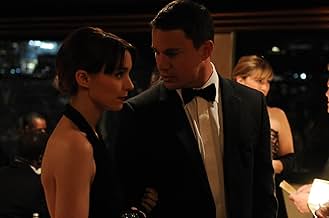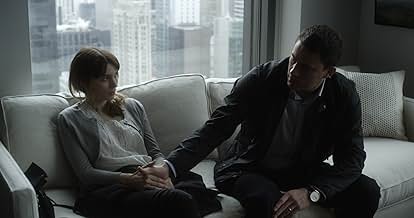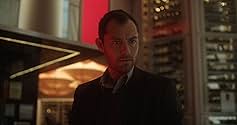Il mondo di una donna va in frantumi quando una droga prescritta dal suo psichiatra rivela degli inaspettati effetti collaterali.Il mondo di una donna va in frantumi quando una droga prescritta dal suo psichiatra rivela degli inaspettati effetti collaterali.Il mondo di una donna va in frantumi quando una droga prescritta dal suo psichiatra rivela degli inaspettati effetti collaterali.
- Regia
- Sceneggiatura
- Star
- Premi
- 5 candidature totali
Recensioni in evidenza
Steven Soderbergh has decided to end his career what can only be described as a pharmaceutical, psychosexual thriller that deals with several morally ambiguous characters all revolving around one horrible incident. Out of fear of giving away the intelligent, twist-filled plot written by Scot Z. Burns, that's really all I can say, although I can tell you that Soderbergh directs the film with extreme confidence, and it shows. He was able to convey a sort of quiet chaos with his frequent close-ups, and, by shifting in-and-out of focus throughout the screen, he was able to draw attention to the many small, yet important details.
The real strength of this film, though, is not necessarily the story itself, but how it is presented. To be honest, the story is almost too smart to the point of absurdity, but it never comes off as such. By releasing only one small piece of information at a time, we are kept waiting through interviews, court hearings, false trails, and many psychiatrist visits until, finally, everything comes together into one neat conclusion. The entire film is very subdued, but if you pay attention, you will be rewarded in the end.
Of course, the story would not have turned out so well without the multiple impressive performances that carry it all the way through. Rooney Mara is once again stunning as Emily Taylor, a woman who starts taking prescription antidepressants to cope with her husband's release from prison. Without giving much away, Emily is far more complex than she first appears, and Mara plays this perfectly by retaining a dark mysteriousness about her. She truly steals every scene she's in, and displays such a range of emotions that, at times, it's difficult to tell what her character is truly thinking. This is unfortunate for Channing Tatum, who does a fine job as her loving and sympathetic husband trying to make everything right after being released for insider trading, but who doesn't have close to enough material to compete with Mara.
Jude Law, on the other hand, is arguably the most central figure as Dr. Jonathan Banks, Emily's psychiatrist who is thrown into a scandal when his patient is involved in a tragic accident after taking an antidepressant he prescribed for her. He slowly mentally unravels as his decisions come back to haunt him, and eventually has to cross several moral boundaries in order to get his life back on track. Law shows this frustration with expert skill, and gives one of the best performances of his recent career. The same can be said for Catherine Zeta- Jones, who—as Emily's former psychiatrist Dr. Victoria Siebert—gives possibly the most complex performance, and does it brilliantly despite her lack of screen time.
To give away any more would be to say too much, as the film is so perfectly structured, it is difficult to discuss without giving away the whole thing. All I can add is, it is not so simple and straightforward as it may appear. It is a complex of characters, their motives, and the consequences of their actions, and, despite taking a while to get started, it is truly a spectacular, thrilling, and intricate journey that should not be missed.
The real strength of this film, though, is not necessarily the story itself, but how it is presented. To be honest, the story is almost too smart to the point of absurdity, but it never comes off as such. By releasing only one small piece of information at a time, we are kept waiting through interviews, court hearings, false trails, and many psychiatrist visits until, finally, everything comes together into one neat conclusion. The entire film is very subdued, but if you pay attention, you will be rewarded in the end.
Of course, the story would not have turned out so well without the multiple impressive performances that carry it all the way through. Rooney Mara is once again stunning as Emily Taylor, a woman who starts taking prescription antidepressants to cope with her husband's release from prison. Without giving much away, Emily is far more complex than she first appears, and Mara plays this perfectly by retaining a dark mysteriousness about her. She truly steals every scene she's in, and displays such a range of emotions that, at times, it's difficult to tell what her character is truly thinking. This is unfortunate for Channing Tatum, who does a fine job as her loving and sympathetic husband trying to make everything right after being released for insider trading, but who doesn't have close to enough material to compete with Mara.
Jude Law, on the other hand, is arguably the most central figure as Dr. Jonathan Banks, Emily's psychiatrist who is thrown into a scandal when his patient is involved in a tragic accident after taking an antidepressant he prescribed for her. He slowly mentally unravels as his decisions come back to haunt him, and eventually has to cross several moral boundaries in order to get his life back on track. Law shows this frustration with expert skill, and gives one of the best performances of his recent career. The same can be said for Catherine Zeta- Jones, who—as Emily's former psychiatrist Dr. Victoria Siebert—gives possibly the most complex performance, and does it brilliantly despite her lack of screen time.
To give away any more would be to say too much, as the film is so perfectly structured, it is difficult to discuss without giving away the whole thing. All I can add is, it is not so simple and straightforward as it may appear. It is a complex of characters, their motives, and the consequences of their actions, and, despite taking a while to get started, it is truly a spectacular, thrilling, and intricate journey that should not be missed.
Good, but not great, crime-drama. Starts well: set up is good, character and plot development is interesting. Set up for an intriguing finish, especially as Jude Law's character is presented with a conundrum.
However, just when you're hooked, cracks start to develop in the plot. Not that the plot has holes, it just starts to get rather far-fetched. Too many twists, some just for twists' sake.
Ending feels contrived and a tad too neat.
However, still an interesting movie.
Good performance from Jude Law and Rooney Mara in the main roles. Catherine Zeta-Jones just doesn't feel right in her role, however. She's maybe too intense, or too one-dimensional.
Channing Tatum is okay in his role.
However, just when you're hooked, cracks start to develop in the plot. Not that the plot has holes, it just starts to get rather far-fetched. Too many twists, some just for twists' sake.
Ending feels contrived and a tad too neat.
However, still an interesting movie.
Good performance from Jude Law and Rooney Mara in the main roles. Catherine Zeta-Jones just doesn't feel right in her role, however. She's maybe too intense, or too one-dimensional.
Channing Tatum is okay in his role.
In "Side Effects", Emily (Rooney Mara) is feeling hopeless, suffering from prolonged effects of abandonment issues, unsure how to proceed in her life. Her husband, Martin (Channing Tatum) has just come home from prison, serving time for insider trading. But Emily doesn't know what she should be feeling; Emily doesn't know how to feel what she should be feeling. Psychiatrist Dr. Jonathan Banks (Jude Law) is exactly what the doctor ordered.
For those of us who watched "Contagion" (2011) and wanted to focus only on Jude Law's morally ambiguous blogger, Alan Krumwiede, we have finally gotten our wish. Law's morally ambiguous Dr. Jon Banks and Mara's psychologically ambiguous Emily are the only two main characters. There is only one story to follow.
It starts off with some strange camera angles (Steven Soderbergh serving as his own director of photography as he has for the majority of his films) but then settles down as a thriller, or what will become a thriller once we get to know the characters better. Emily has tried many antidepressants in the past but most leave her with undesired side effects: nausea, dizziness, or lack of a sex drive. Won't Dr. Banks please prescribe her something different? Sure, how about Ablixa, the new medication which Dr. Banks is being paid to try out on patients.
And although we now think we know in which character evil lies, we do not. Dr. Jonathan Banks is singularly the most complicated, interestingly created character in recent times. He's modern, selfish, compassionate, professionally-oriented, family-oriented, has respect for the legal system, and will go to extremes to distinguish between right and wrong. He's the focus of this character-centric, film noir thriller which uses Mara's Emily as the vehicle for the plot.
A crime is committed. It's bad, really bad. But the question is not who did it, the question is, who is guilty? In answering that question the film weaves from deception through twist to deception, never ceasing our questions of what is morally right, what is morally wrong and who is guilty? The screenplay is incredibly well-written, creating characters that amaze us, disappoint us and deceive us all the while being a part of an interesting and complex story. The dialogue fits with that theme, using words like "hopeless" to tie multiple characters together - conceptually not physically.
It's more of an edge-of-your-mind thriller rather than an edge-of-your- seat thriller. Never really scared, always questioning the moral and psychological behaviour of these characters. The ending takes some strange, sexually-charged turns, and perhaps a bit more conclusive than I was originally expecting, but don't worry, you can still question where the line is between right and wrong and when each character crossed it.
For those of us who watched "Contagion" (2011) and wanted to focus only on Jude Law's morally ambiguous blogger, Alan Krumwiede, we have finally gotten our wish. Law's morally ambiguous Dr. Jon Banks and Mara's psychologically ambiguous Emily are the only two main characters. There is only one story to follow.
It starts off with some strange camera angles (Steven Soderbergh serving as his own director of photography as he has for the majority of his films) but then settles down as a thriller, or what will become a thriller once we get to know the characters better. Emily has tried many antidepressants in the past but most leave her with undesired side effects: nausea, dizziness, or lack of a sex drive. Won't Dr. Banks please prescribe her something different? Sure, how about Ablixa, the new medication which Dr. Banks is being paid to try out on patients.
And although we now think we know in which character evil lies, we do not. Dr. Jonathan Banks is singularly the most complicated, interestingly created character in recent times. He's modern, selfish, compassionate, professionally-oriented, family-oriented, has respect for the legal system, and will go to extremes to distinguish between right and wrong. He's the focus of this character-centric, film noir thriller which uses Mara's Emily as the vehicle for the plot.
A crime is committed. It's bad, really bad. But the question is not who did it, the question is, who is guilty? In answering that question the film weaves from deception through twist to deception, never ceasing our questions of what is morally right, what is morally wrong and who is guilty? The screenplay is incredibly well-written, creating characters that amaze us, disappoint us and deceive us all the while being a part of an interesting and complex story. The dialogue fits with that theme, using words like "hopeless" to tie multiple characters together - conceptually not physically.
It's more of an edge-of-your-mind thriller rather than an edge-of-your- seat thriller. Never really scared, always questioning the moral and psychological behaviour of these characters. The ending takes some strange, sexually-charged turns, and perhaps a bit more conclusive than I was originally expecting, but don't worry, you can still question where the line is between right and wrong and when each character crossed it.
The poster of Side Effects features four famous faces on it: clockwise, you see Jude Law, Catherine Zeta-Jones, Rooney Mara, and Channing Tatum. There is a suggestion of a complex relationship between their characters - and of somewhat equal parts in the story. Both of those assumptions are proven false. Dr Jonathan Banks (played by Law) is gradually revealed as the protagonist of Side Effects, while his patient Emily Taylor (Mara) has a supporting, if most remarkable, role. Zeta-Jones plays the snake in the grass and spends most of the film out of sight, while Channing Tatum is briefly introduced as a handsome piece of furniture.
Side Effects has most in common with a Hitchcock thriller: Dr Banks faces a false accusation and must clear his name, with no support from his colleagues or from authorities. Characters are duplicitous and untrustworthy, and the question is not who is lying (everyone, everyone is lying), but how and why. Someone dies.
Rooney Mara delivers a great performance as a mentally unstable socialite - I whole-heartedly agree with Peter Bradshaw (The Guardian) praising her 'ability to be scared and scary at the same time'. As Mara's part is that of an unreliable narrator, it soon proves difficult to empathise with her character fully; instead, you spend a good while doubting her, yourself, and whether you are experiencing a déjà vu and whether you are experiencing a déjà vu.
There is no doubt that Side Effects is clever, yet, for me, the picture lacks in three important respects. The big questions about the use of mood-altering medication, experimental and otherwise, are raised, but then dropped as soon as the focus of the plot development shifts elsewhere. Two, the perilous and exciting romance - the supposed undercurrent of the narrative - feels shoehorned and staged. Finally, the ending brings us nearly full circle, and you are left wondering if the whole experience has had any effect on the protagonist.
Given that my original goal, when picking the film, was to see more praiseworthy acting by Zeta-Jones, I should find Side Effects satisfying. Unfortunately, as intelligent, ambitious, and well-acted as the film is, it lacks narrative cohesion and unity of tone, with the finale appearing as if a bow on a box.
Side Effects has most in common with a Hitchcock thriller: Dr Banks faces a false accusation and must clear his name, with no support from his colleagues or from authorities. Characters are duplicitous and untrustworthy, and the question is not who is lying (everyone, everyone is lying), but how and why. Someone dies.
Rooney Mara delivers a great performance as a mentally unstable socialite - I whole-heartedly agree with Peter Bradshaw (The Guardian) praising her 'ability to be scared and scary at the same time'. As Mara's part is that of an unreliable narrator, it soon proves difficult to empathise with her character fully; instead, you spend a good while doubting her, yourself, and whether you are experiencing a déjà vu and whether you are experiencing a déjà vu.
There is no doubt that Side Effects is clever, yet, for me, the picture lacks in three important respects. The big questions about the use of mood-altering medication, experimental and otherwise, are raised, but then dropped as soon as the focus of the plot development shifts elsewhere. Two, the perilous and exciting romance - the supposed undercurrent of the narrative - feels shoehorned and staged. Finally, the ending brings us nearly full circle, and you are left wondering if the whole experience has had any effect on the protagonist.
Given that my original goal, when picking the film, was to see more praiseworthy acting by Zeta-Jones, I should find Side Effects satisfying. Unfortunately, as intelligent, ambitious, and well-acted as the film is, it lacks narrative cohesion and unity of tone, with the finale appearing as if a bow on a box.
In our pharmaceutically inclined society, side effects are ever-present hazards of prescription drug usage. Whether they are minimized in print, or spoken in a hushed tone at the close of television commercials, side effects have become a shady companion of prescription drugs. Side Effects, Steven Soderbergh's alleged final film, focuses on the consequences visited upon a young couple after the side effects from the wife's medication cause her to commit an alarming act. As the chasm opens beneath this young woman, her psychiatrist struggles with his responsibility for her predicament, and confront his lingering suspicion about his patient's state of mind.
Ever the auteur, Soderbergh remains delightfully unpredictable with this latest feature. Side Effects initially presents itself as an indictment of the pharmaceutical industry, wearing its heavy-handed message on its sleeve, but promptly converts into a psychological suspense thriller. Soderbergh stares you directly in the eyes while he rips the rug from beneath your feet, sending you spiraling toward a conclusion that is equally unexpected and pleasing. Soderbergh and screenwriter Scott Z. Burns (Contagion, The Bourne Ultimatum) channel Hitchcock, creating an in-depth narrative that remains unpredictable until its final scene.
Soderbergh is known for generating a positive film environment for his cast, and maximizing the actors' potential in his films. Although the cast for Side Effects is comprised of actors who have previously provided impressive performances, each actor presents a character that rivals any prior roles. Rooney Mara plays the young woman at the epicenter of the conflict. Mara is extremely engrossing, creating an aura of discontent and depression within her situation. She acts as the film's catalyst, holding all the characters together while prompting them toward their conclusions. Attractive, graceful, and erratic, Mara is the wounded girl who isn't all that she seems.
While the film's driving force is Mara, Jude Law is its principle focus. As Mara's overwhelmed psychiatrist, Law provides his most empathetic role to date. Law establishes a flawed character who struggles with the consequences forced upon him, and transforms into a protagonist worthy of our admiration. Law and Mara provide such intriguing characterizations, Soderbergh seems to have difficulty deciding which to devote more time to. The scenes they share are the most arresting in this film.
There are few things more satisfying than a film which receives little attention, but creates an unexpectedly entertaining experience. Though Soderbergh has billed Side Effects as his swan song, he confirms that he is a cinematic mastermind in a film that would be an impressive conclusion to an eccentric career. Indulge in this unconventional thriller; you won't mind the side effects.
flickermotion.blogspot.com/
Ever the auteur, Soderbergh remains delightfully unpredictable with this latest feature. Side Effects initially presents itself as an indictment of the pharmaceutical industry, wearing its heavy-handed message on its sleeve, but promptly converts into a psychological suspense thriller. Soderbergh stares you directly in the eyes while he rips the rug from beneath your feet, sending you spiraling toward a conclusion that is equally unexpected and pleasing. Soderbergh and screenwriter Scott Z. Burns (Contagion, The Bourne Ultimatum) channel Hitchcock, creating an in-depth narrative that remains unpredictable until its final scene.
Soderbergh is known for generating a positive film environment for his cast, and maximizing the actors' potential in his films. Although the cast for Side Effects is comprised of actors who have previously provided impressive performances, each actor presents a character that rivals any prior roles. Rooney Mara plays the young woman at the epicenter of the conflict. Mara is extremely engrossing, creating an aura of discontent and depression within her situation. She acts as the film's catalyst, holding all the characters together while prompting them toward their conclusions. Attractive, graceful, and erratic, Mara is the wounded girl who isn't all that she seems.
While the film's driving force is Mara, Jude Law is its principle focus. As Mara's overwhelmed psychiatrist, Law provides his most empathetic role to date. Law establishes a flawed character who struggles with the consequences forced upon him, and transforms into a protagonist worthy of our admiration. Law and Mara provide such intriguing characterizations, Soderbergh seems to have difficulty deciding which to devote more time to. The scenes they share are the most arresting in this film.
There are few things more satisfying than a film which receives little attention, but creates an unexpectedly entertaining experience. Though Soderbergh has billed Side Effects as his swan song, he confirms that he is a cinematic mastermind in a film that would be an impressive conclusion to an eccentric career. Indulge in this unconventional thriller; you won't mind the side effects.
flickermotion.blogspot.com/
Lo sapevi?
- BlooperDr. Banks would never have been allowed to be an expert witness in a case in which he was the defendant's psychiatrist. This would present a blatant conflict of interest. He could only be a fact witness.
- Citazioni
Dr. Jonathan Banks: Depression is an inability to construct a future.
- ConnessioniFeatured in The Tonight Show with Jay Leno: Episodio #21.81 (2013)
- Colonne sonoreThe Forgotten People
Performed by Thievery Corporation
Written by Rob Garza (as Robert Garza) and Eric Hilton
Courtesy of ESL Music
I più visti
Accedi per valutare e creare un elenco di titoli salvati per ottenere consigli personalizzati
Dettagli
- Data di uscita
- Paese di origine
- Siti ufficiali
- Lingue
- Celebre anche come
- Terapia de riesgo
- Luoghi delle riprese
- Aziende produttrici
- Vedi altri crediti dell’azienda su IMDbPro
Botteghino
- Budget
- 30.000.000 USD (previsto)
- Lordo Stati Uniti e Canada
- 32.172.757 USD
- Fine settimana di apertura Stati Uniti e Canada
- 9.303.145 USD
- 10 feb 2013
- Lordo in tutto il mondo
- 63.414.135 USD
- Tempo di esecuzione
- 1h 46min(106 min)
- Colore
- Mix di suoni
- Proporzioni
- 1.85 : 1
Contribuisci a questa pagina
Suggerisci una modifica o aggiungi i contenuti mancanti








































